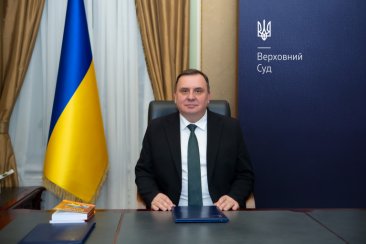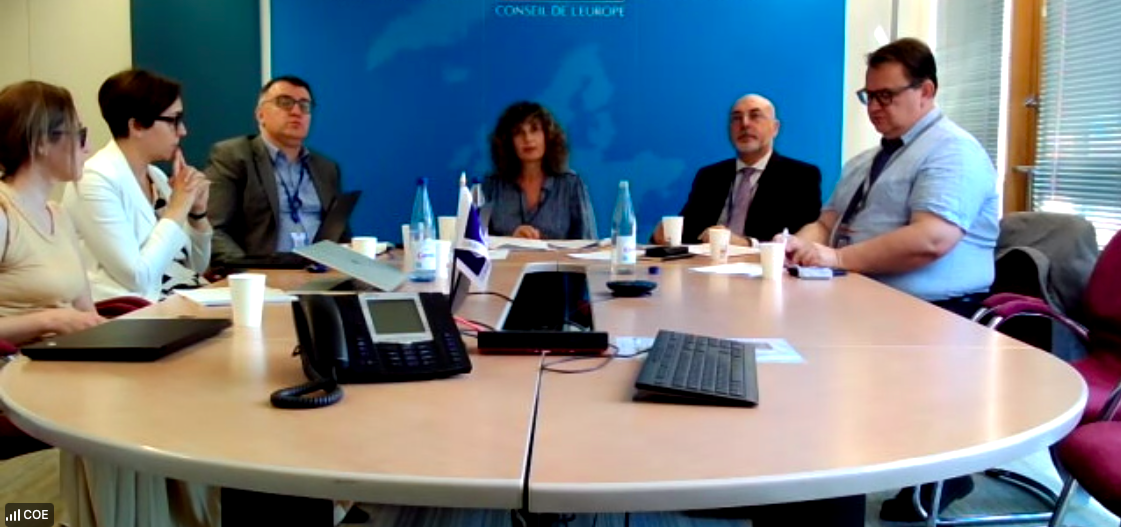Contact center of the Ukrainian Judiciary 044 207-35-46

The Supreme Court remains consistent in its belief that the state must fulfil its obligations not only to comply with the provisions of the Convention for the Protection of Human Rights and Fundamental Freedoms, but also to implement the judgments of the European Court of Human Rights.
This was emphasised by President of the Supreme Court Stanislav Kravchenko during a meeting with the Head of the Council of Europe's Human Rights Department, Clare Ovey.
According to the SC President, a prerequisite for the proper implementation of ECtHR judgments and an effective mechanism for preventing violations of the Court's judgments in the future is their detailed analysis, which is systematically carried out, in particular, as part of educational activities for judges. Thus, last year, the Supreme Court, together with the Council of Europe, held a series of roundtables to discuss the current practice of the European Court of Human Rights in cases against Ukraine and other Council of Europe member states, which were attended by judges from all regions of Ukraine.
During these seminars, the speakers repeatedly drew attention to the fact that one of the key systemic problems identified by the ECtHR in a number of judgments in cases against Ukraine is the excessive length of court proceedings.
"Unfortunately, we cannot hope for a radical improvement in the situation in the near future, mainly due to a significant shortage of judicial personnel. The judicial system needs human resources to perform its tasks properly. The most difficult situation is observed in the courts of appeal: in some of them it is impossible to form a panel to consider a case. At the same time, the workload of the judicial system is constantly increasing, and the length of competitive procedures for selecting judges does not allow for the prompt filling of existing vacancies. Therefore, the problem of the duration of court proceedings is systemic and requires a comprehensive approach to solve," said the SC President.
In addition, a number of ECtHR judgments in cases against Ukraine concern issues of detention during pre-trial investigation and the lack of motivation for extending the term of preventive measures. In this aspect, the problem is that the rulings of investigating judges are not subject to cassation appeal, so the Supreme Court lacks mechanisms for promptly resolving legal problems arising from these issues and developing approaches to their resolution.
Nevertheless, the Supreme Court, within the limits of its powers, makes every effort to respond to violations established by the ECtHR and to take individual and general measures to implement the Court's judgments. At the same time, the Supreme Court is considering the possibility of forming important positions for the legal system of Ukraine when reviewing cases under exceptional circumstances.

Clare Ovey, Director of the Human Rights Department of the Council of Europe, first of all, expressed her gratitude for the leading role played by the Supreme Court in the implementation of the judgments of the European Court of Human Rights and for its efforts to harmonise the practice of national courts with the positions and approaches developed by the ECtHR.
Clare Ovey also noted that the Council of Europe is implementing a number of projects aimed at building the capacity of the judiciary and providing assistance to Ukraine. In particular, within the framework of the criminal justice project, it is planned to analyse the case law of national courts on pre-trial detention in order to assess the results achieved and outline ways to further move towards solving the problems associated with the application of such a preventive measure.
Among the areas of further cooperation, the Director of the CoE Human Rights Department highlighted the development of the communication component of the judiciary and joint activities that will contribute to the formation of a common vision of addressing urgent issues of judicial reform.
In addition, Clare Ovey informed about the preparation of a report on the implementation of the ECtHR judgment in the case of Oleksandr Volkov v. Ukraine, as well as the analysis of draft laws relating to judicial integrity.
According to the President of the Supreme Court, these issues are very important, as the independence of the judiciary is the key to its further effective development. Thus, after the ECtHR judgement in the case of Oleksandr Volkov v. Ukraine, a number of positive changes have taken place aimed at strengthening the judicial system as an institution, and some problems have been resolved, but some issues remain unresolved to this day.
Summing up, Stanislav Kravchenko stressed that the Supreme Court is open to constructive dialogue and is ready to provide the Council of Europe with comprehensive information on the state of functioning of the judiciary, as well as judicial independence and certain legislative initiatives that pose a threat to it.